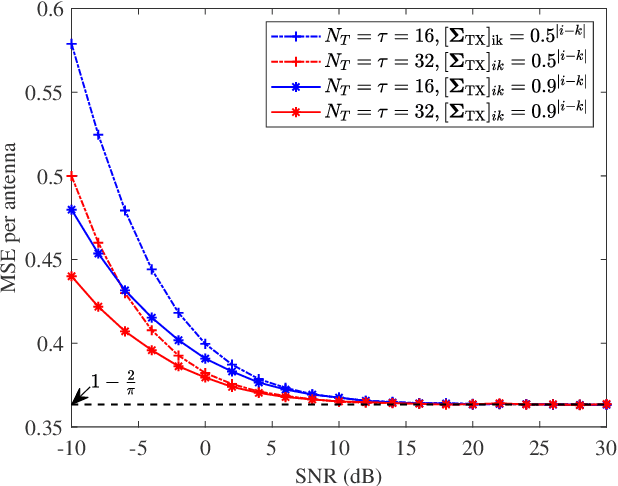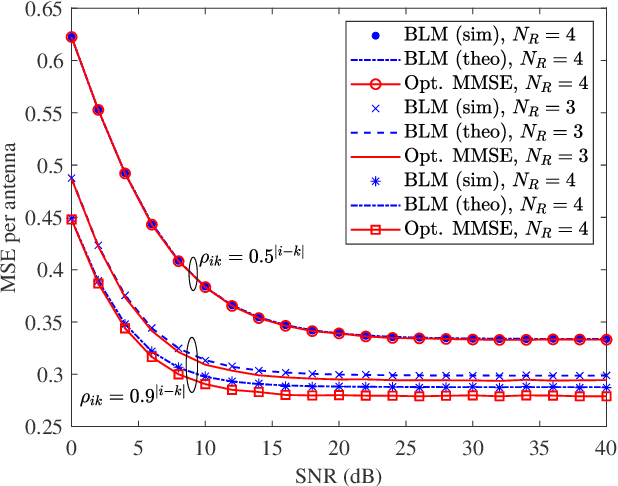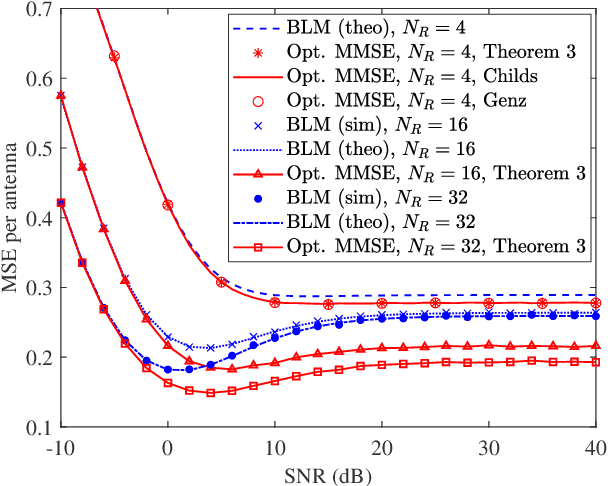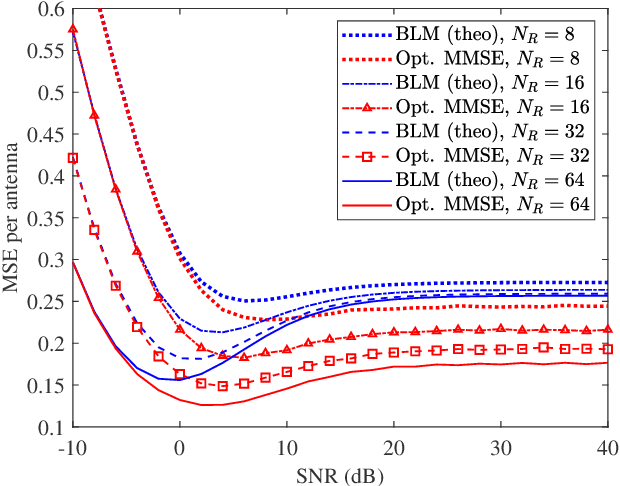Minhua Ding
The Effect of Noise Correlation on MMSE Channel Estimation in One-Bit Quantized Systems
Jan 18, 2026Abstract:This paper analyzes the impact of spatially correlated additive noise on the minimum mean-square error (MMSE) estimation of multiple-input multiple-output (MIMO) channels from one-bit quantized observations. Although additive noise can be correlated in practical scenarios, e.g., due to jamming, clutter, or other external disturbances, the effect of such correlation on the MMSE channel estimator in this setting remains unexplored in prior work. Against this backdrop, we derive a novel analytical expression for the general MIMO MMSE channel estimator, which is inherently nonlinear in one-bit observations, and accommodates arbitrary channel and noise correlation structures. To further characterize the impact of noise correlation, we subsequently specialize the general MMSE expression to certain tractable multi antenna configurations in which both the channel and the noise assume single-parameter constant correlation structures. Our analyses reveal nontrivial, noise-correlation-induced scenarios in which the estimator remains linear despite non-zero channel and noise correlation parameters. Moreover, the results indicate that, at low-to-medium signal-to-noise ratio, noise correlation improves the MMSE performance when channels are uncorrelated, but degrades performance when channels are strongly correlated.
SEP Analysis of a Low-Resolution SIMO System with M-PSK over Fading Channels
Jan 06, 2026Abstract:In this paper, the average symbol error probability (SEP) of a phase-quantized single-input multiple-output (SIMO) system with M-ary phase-shift keying (PSK) modulation is analyzed under Rayleigh fading and additive white Gaussian noise. By leveraging a novel method, we derive exact SEP expressions for a quadrature PSK (QPSK)-modulated n-bit phase-quantized SIMO system with maximum ratio combining (SIMO-MRC), along with the corresponding high signal-to-noise ratio (SNR) characterizations in terms of diversity and coding gains. For a QPSK-modulated 2-bit phase-quantized SIMO system with selection combining, the diversity and coding gains are further obtained for an arbitrary number of receive antennas, complementing existing results. Interestingly, the proposed method also reveals a duality between a SIMO-MRC system and a phase-quantized multiple-input single-output (MISO) system with maximum ratio transmission, when the modulation order, phase-quantization resolution, antenna configuration, and the channel state information (CSI) conditions are reciprocal. This duality enables direct inference to obtain the diversity of a general M-PSK-modulated n-bit phase-quantized SIMO-MRC system, and extends the results to its MISO counterpart. All the above results have been obtained assuming perfect CSI at the receiver (CSIR). Finally, the SEP analysis of a QPSK-modulated 2-bit phase-quantized SIMO system is extended to the limited CSIR case, where the CSI at each receive antenna is represented by only 2 bits of channel phase information. In this scenario, the diversity gain is shown to be further halved in general.
SEP Analysis of 1-Bit Quantized SIMO Systems with QPSK over Fading Channels
Oct 02, 2025Abstract:The average symbol error probability (SEP) of a 1-bit quantized single-input multiple-output (SIMO) system is analyzed under Rayleigh fading channels and quadrature phase-shift keying (QPSK) modulation. Previous studies have partially characterized the diversity gain for selection combining (SC). In this paper, leveraging a novel analytical method, an exact analytical SEP expression is derived for a 1-bit quantized SIMO system employing QPSK modulation at the transmitter and maximum ratio combining (MRC) at the receiver. The corresponding diversity and coding gains of a SIMO-MRC system are also determined. Furthermore, the diversity and coding gains of a 1-bit quantized SIMO-SC system are quantified for an arbitrary number of receive antennas, thereby extending and complementing prior results.
Optimality of the Bussgang Linear MMSE Channel Estimator for MIMO Systems with 1-Bit ADCs
Jul 18, 2024

Abstract:In this paper, we study the optimality of the Bussgang linear minimum mean squared error (BLMMSE) channel estimator for multiple-input multiple-output systems with 1-bit analog-to-digital converters. We compare the BLMMSE with the optimal minimum mean squared error (MMSE) channel estimator, which is generally non-linear, and we develop a novel framework based on the orthant probability of a multivariate normal distribution to compute the MMSE channel estimate. Then, we analyze the equivalence of the MMSE and BLMMSE channel estimators under specific assumptions on the channel correlation or pilot symbols. Interestingly, the BLMMSE channel estimator turns out to be optimal in several specific cases. Our study culminates with the presentation of a necessary and sufficient condition for the BLMMSE channel estimator to be optimal.
On the Optimal MMSE Channel Estimation for One-Bit Quantized MIMO Systems
Apr 08, 2024



Abstract:This paper focuses on the minimum mean squared error (MMSE) channel estimator for multiple-input multiple-output (MIMO) systems with one-bit quantization at the receiver side. Despite its optimality and significance in estimation theory, the MMSE channel estimator has not been fully investigated in this context due to its general non-linearity and computational complexity. Instead, the typically suboptimal Bussgang linear MMSE (BLMMSE) estimator has been widely adopted. In this work, we develop a new framework to compute the MMSE channel estimator that hinges on computation of the orthant probability of the multivariate normal distribution. Based on this framework, we determine a necessary and sufficient condition for the BLMMSE channel estimator to be optimal and equivalent to the MMSE estimator. Under the assumption of specific channel correlation or pilot symbols, we further utilize the framework to derive analytical expressions for the MMSE channel estimator that are particularly convenient for computation when certain system dimensions become large, thereby enabling a comparison between the BLMMSE and MMSE channel estimators in these cases.
 Add to Chrome
Add to Chrome Add to Firefox
Add to Firefox Add to Edge
Add to Edge